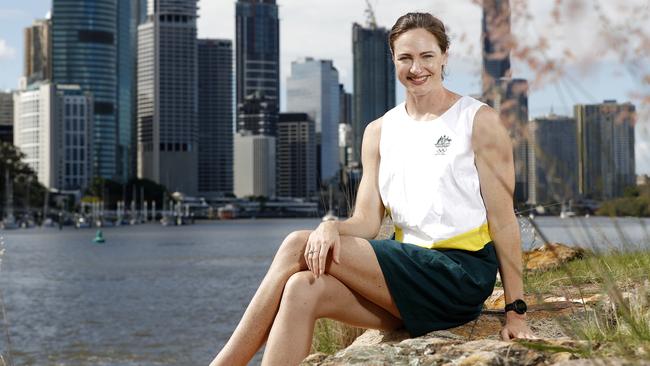Swimming must end the era of ‘dictator’ coaches
Ian Thorpe’s 10 per cent formula shows why the fat shaming of swimmers is both flawed and abusive.

It shows you something is quite rotten about Australian swimming when yet another decorated Olympian comes forward to speak about the body shaming they’ve been put through.
On the weekend Olympic gold medallist Cate Campbell revealed a hectic, self-loathing spiral she went into over the calorie count of full-cream milk. She told of the disordered eating that almost broke her body and caused her to withdraw from the Commonwealth Games 12 years ago in Delhi.
It again raises questions around the foundations on which Australian swim coaching has been built, which is this firm belief that “thinner is faster”. And if this philosophy has had such damaging results, then who is stopping coaches from employing them today?
Some of our biggest names have not escaped unscathed. Leisel Jones was eating just a “single red apple” for lunch and soup for dinner in the lead up to the 2008 Beijing Olympics, after she was told by a gym coach that “you just might swim faster if you were lighter”.
“I’ve got it into my head that I am too fat and if I can just lose more weight I will win the 100-metre event for sure,” Jones writes in her book Body Lengths.
For Emily Seebohm, she told The Australian how her life descended into a cycle of bingeing, purging and laxatives all after a Swimming Australia’s official quip a few years ago that losing weight would make her “faster”. This year triple Olympic gold medallist Libby Trickett said she too had been “body shamed” during her career.
Campbell revealed it was at the Beijing Olympics that all “the girls” on the team – which included Seebohm, Trickett and Jones – were told to use smaller plates at dinner so they wouldn’t overeat. Campbell also details the weekly weigh-ins and the public admonishments that occurs at other swimming squads.
“The general consensus from most other male coaches was: the skinnier the better,” Campbell writes in her book Sister Secrets alongside her sister Bronte. Campbell would later ditch the scales. “I still advocate that we should not be measuring our health by numbers – not calories, not kilograms, not skin-fold measurements, not clothing sizes. Instead I focused on what I was able to achieve.”
Of those in charge at the Beijing Olympics – many remain coaching today – and these practices remain part and parcel of the sport. What evidence is this based on? Not much.
Ian Thorpe says he swam “well” at both 105 kilograms and at 90 kilograms. During his career he pointed out the damaging fixation on weight by some swimming coaches.
“The vast majority of coaches are lecturing about diet and they are obese…,” Thorpe told Australian Story in 2007. “When you get in the pool it’s like being 10 per cent of your body weight, that one or two kilograms that coaches have stressed over in the past, really equate to 100 to 200 grams in the water.”
His then coach Tracey Menzies – one of only two Australian females to ever coach at an elite level – on Australian Story in 2007 spoke to a deeper issue plaguing the sport that arguably remains today.
“There’s coaches that will still have those dogmatic approaches; that they own that athlete, they own their eating rights, they own their training rights and they own even their thinking. They are dictators,” Menzies told the program. “I don’t see it as a successful way of coaching.”
Menzies, who coached Thorpe to gold in 2004, was lost to the sport of swimming last year. She now works in gymnastics – most say is a testament to the unwelcoming culture for women in the sport.
The Australian has also spoken to swimmers who speak candidly about senior squad members teaching them how to vomit in the toilets at the pool to keep their skin folds down. Of coaches telling them it’s good to “not to get their period”, the shame felt around public-weighing. There was the swimmer who said that she was put on a “keto diet” at age 12 – by an Olympic coach.
There is currently a review into the sport and its handling of women and girl swimmers. But men, like decorated former Olympian Daniel Kowalski, have suffered too. He told Yahoo!Sport about a shocking time after the 1996 Games. “I started to develop a lot of issues with my body image and how I viewed myself. I became extremely bulimic, would binge eat and purge and there were a lot of dark times where I felt it would be a lot easier to not be around,” Kowalski said.
“I thought long and hard about ‘how do I end my life’.”
But as we have seen from his experience, as well as Campbell’s, Jones’, Trickett and Seebohm’s admissions, disordered eating and practices are far too ingrained in this culture. What will Swimming Australia do about this? Hopefully the review will toss up some answers.
Until then what remains true is many of these coaches, who have overseen these practices, remain on deck guiding our future Olympic stars.




To join the conversation, please log in. Don't have an account? Register
Join the conversation, you are commenting as Logout